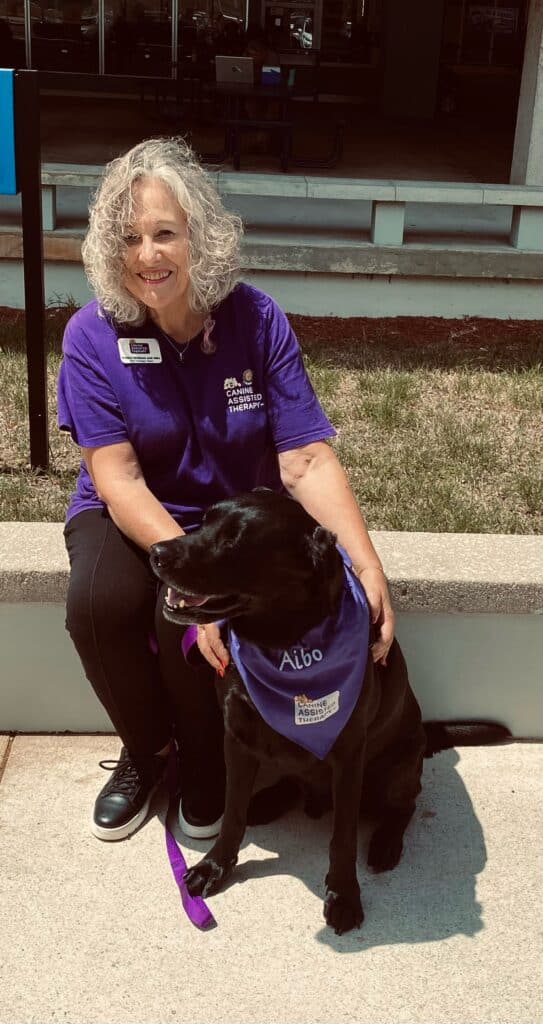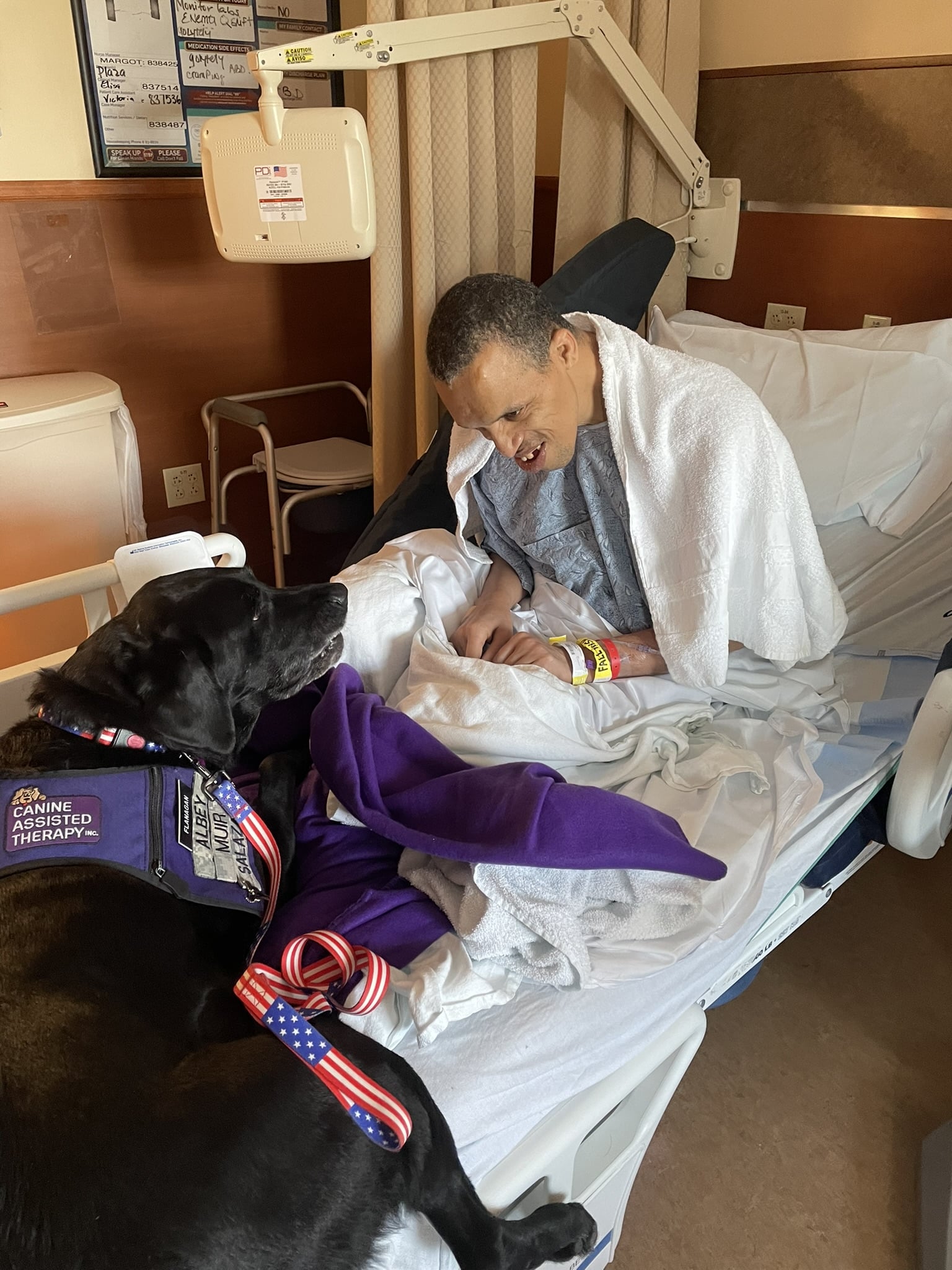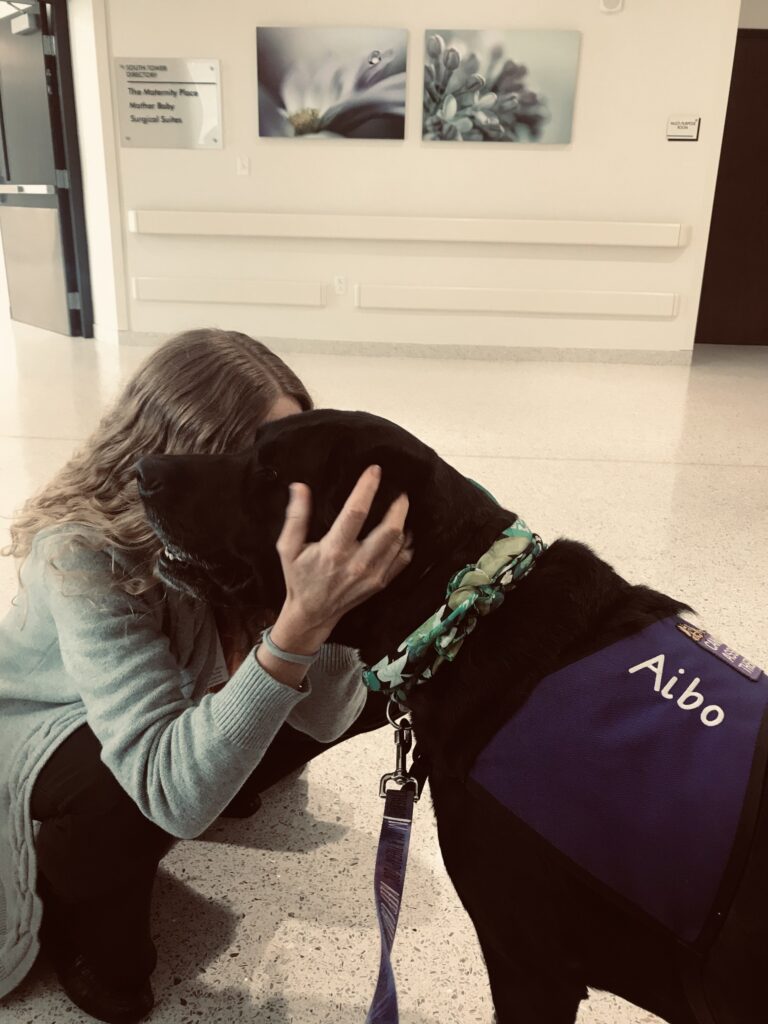TRIBUTE TO OUR HEROES: Debbie Wellman & Aibo
May 27, 2025
In this latest episode of “A Tribute to Our Heroes,” we talk with a Soldiers’ Angels volunteer and the owner of therapy dog, Aibo.
Debbie and Adrian discuss her time volunteering with the Soldiers’ Angels letter writing team, and how her dog, Aibo, helps her give back to Veterans at the West Palm Beach VA.
You can view our full video interview with Debbie and Aibo below.
Q: Who are you, and who is Aibo?
Well, my name is Debbie Wellman. I live in Sunrise, Florida. Aibo and I have been volunteering together for seven and a half years. We belong to Soldiers’ Angels and also an organization called K9 Assisted Therapy, and it kind of got the two together so that we could provide pet therapy to Veterans, as well as anybody else. And so that’s who I am. That’s what we do. Three to four times a week, we visit different facilities, whether it’s a nursing home or the West Palm Beach VA, we have a lot of different facilities that we go to.
Q: How old is Aibo, and when did he start being a therapy dog?
Aibo here will be nine at the end of July, so he’s eight and a half. Aibo came to me unexpectedly when he was about a year and a half, 18 months. We started volunteering when he was about two to two and a half. So, we’ve been doing that ever since he was — you have to take a K9 good citizen test, and once he was approved for that, and with K9 — assisted therapy, he was approved there, and we’ve been volunteering ever since
Q: How long have you been volunteering with Soldiers’ Angels?
Over 15 years. Probably 17 or 18 years. I started when I lived in Minnesota, and I was looking for a way to give back, and I saw Soldiers’ Angels on TV, and I thought, “Oh my gosh, that’s perfect.” So, I joined several of their different teams, and then I ended up moving to Florida. I was on the letter-writing team in Florida, and then it just grew from there. I got Aibo and started doing our therapy work and whatever else Soldiers’ Angels needed me to do. They’ve had me speak at organizations for them down here in South Florida. We’ve done several things with the Panthers, and then most of the stuff has been at the West Palm Beach VA.
Q: How did you find out about Soldiers’ Angels?
The funny thing is, I was living in Minnesota, and I had come down to Florida. Part of it was for work, and then I stayed a couple extra days. I was in the hotel room getting ready to — I don’t know, go to the beach or do something — and Soldiers’ Angels came on, it was on a local news program. That’s how I heard about it. So, I went back to Minnesota and researched it — wrote it down very quickly — as I was going out the door, and I researched it, and then I joined. Went home and joined.
Q: What are some of the more memorable experiences that you’ve had volunteering with us on the letter writing team?
Oh my gosh. My most memorable is right when I moved here, I got a name for the letter-writing team. And I got this soldier’s name, and I wrote to him. And we continued to write for 10 years, and I only knew his name. And he would say to me — I gave him my email as well as my phone number after a while — and I said You know, contact me anytime. And he would write, and he would say, “I’m coming back, you don’t need to write anymore,” and then he would say, “I’m going to redeploy, so will you write to me again?” So, I wrote and sent boxes. He emailed me– it was about 10 years later — and said I would like to put a voice to the name that I’ve been writing to — we’ve been corresponding together — and I said “absolutely! You know, please call me.” He was on his way to Afghanistan again, and we talked for 2 hours, and I guess the rest is kind of history. He has come to Florida and stayed with me — and I met him here in Florida — and then he lived in Virginia for a while, and I was lucky enough to go stay with him in Virginia and meet his wife. That’s such a great thing for me. He’s just such a wonderful guy. And it’s like meeting your hero, or a hero you know, all those years he was in the service.
Q: How did you find Aibo? What made you want to adopt him? And how did he end up going on the pet therapy route?
Aibo came from Southeastern Guide Dogs. He was going to be someone’s guide dog. He showed signs—inconsistently–of being afraid of kids, so he couldn’t continue in the program. So, I was able to adopt him, and it was totally unexpected, but it happened. Thank goodness. So, I got him, and we did some additional training. Because he did come with some basic training, and so we did some more, and then we joined the organization called K9 Assisted Therapy. They pair you up with places to visit. Nursing homes or hospitals, or whatever. On all those visits, it was always the Veterans, mostly guys, that just wanted to see Aibo. They wanted to pet him, they wanted to be with him, and I thought, “You know, I have to combine Soldiers’ Angels and K9 Assisted Therapy somehow to get the therapy dogs to the Veterans.” I made that happen through the West Palm Beach VA and in K9 Assisted Therapy.
Q: Do you remember what it was like to take Aibo to the West Palm Beach VA for the first time?
It was amazing how many people wanted to connect with him. I had to take some classes for us to be able to go to the psychiatric ward, and we go there every time. One of the last times we were there– whenever I go to visit, I make that I speak to everyone that’s there in the room or close by us –some people don’t care to speak to him and that’s fine, some people do. So, I always go to that ward during their — it’s like music therapy and they play games and do that kind of stuff — so that’s when always when Aibo and I visit. There was a gentleman sitting over alone by himself, not interacting with anybody, and I thought to myself, “I’ve got to make sure I speak to him on my way out and we say “hello.” Just as we’re getting ready to go, he came over and he sat down on the floor with Aibo, and he started talking. And he talked to Aibo, he talked to several of us that were there. As they let me out that day– you have to go through you know couple doors to get out and they let me out — the gentleman that I work with there said “If anybody ever tells you dog therapy or pet therapy isn’t any good or doesn’t exist, they don’t know what they’re talking about. I have tried for four days to get that man, that Vet, to open up and to talk to me, or to talk to anyone here, and he has not talked to anyone until he talked to Aibo today.”
Q: What do you think it is about dogs that makes Veterans feel comfortable around them?
Aibo likes everybody. There’s very few people a dog doesn’t like. They don’t judge you. They don’t care if you drive a Mercedes or a Ford. They don’t care. They like you as you are. They’re not going to tell any of your secrets if you talk to them. They’re just there to give you comfort.
Q: What’s another impactful moment you’ve seen of Aibo interacting with a Veteran?
At the VA, we go to several different waiting areas to sit with them. We’ve had a lot of experiences and talked to so many great people, and a lot of times it’s a spouse who’s waiting for a Veteran while they’re with the doctor. On this visit, we went up to this gentleman, and he just wanted to see Aibo. He just had to see him. So, I took Aibo over, and Aibo’s name is always an icebreaker, because it means friend or companion in Japanese. We talked to this gentleman, and he had a cap from Vietnam on. He said, “I had a bomb sniffing dog when I was in Vietnam, and I trained him” he said that “the military didn’t give us the dog; if we found a dog, we would train them, and I trained him.” And he talked a little bit. And I said, “Oh my gosh.” I was so interested in talking to him. And then I said, “Well, were you able to bring the dog back with you?” And he said, “No. He died when he found a bomb.” And as I looked down, I had not looked down, I don’t know why I hadn’t, but I hadn’t looked down, and he had no legs. There he was talking to me with all he’d done for us, and I realized that he’d lost the dog and his legs both at the same time. We had a great conversation. He loved Aibo, and I didn’t see him again, but I hope that, you know, for the 10-15 minutes we talked, that I know that Aibo gave him a lot of comfort in those few minutes.
Q: Does Aibo have a process of finding people that need comfort?
When you, or when I, started out, you think “oh that person over there. I’m pretty sure that they need me. They need me more than you know, the other person two chairs over.” And so, one of the ladies that I volunteer with said to me, “When you go in a room, you let your dog. He will know. Your dog will know who to go to. Who needs them the most.” And it took me a while to read Aibo’s signs, but we’ve done it so much now that I know. I don’t pick who he should go see. I leave it to him. Sometimes he’ll stand in the doorway and look around, and he just goes straight to whoever he thinks needs him. We were in a nursing home, and there was a gentleman sitting in a chair. I do my thing, “Would you like to say hi to Aibo today, he’s here to visit with you?” And he didn’t say anything. And I said, “Okay,” but Aibo leaned into him. He just leaned way into him. Stood very tight to him in the chair, and pretty soon Aibo looked up at me. And as he looked up at me, the gentleman, he looked at me, nodded his head. Aibo knew that was the sign. We were done. He didn’t want to pet him; he just wanted him to stand by him, and he did.
Q: Is Aibo your first therapy dog ever?
Yes. I had a lab-Dane mix that I had hoped would be a therapy dog, but he didn’t pass all the tests. So, he didn’t get to be. But Aibo is very calm, very chill. Nothing rattles him very much. Loud noises don’t bother him. Other dogs don’t bother him. He’s lying here next to me now. That’s what he does. When we go, he’s always willing to lay and wait unless, of course, he’s talking to somebody.
Q: Did he ever get over his hesitations or fear of children?
Yeah, he did. We worked on it. He does not like toddlers. He just doesn’t. Sometimes he does, sometimes he doesn’t. But when we went and did the test for kids, they talked me into doing it, they said, “It’ll be fine. Aibo’s really good. It’ll be fine.” So, I went and did the test. And we went in the room and there’s 17 kids. And we go down the line and we greet each of those kids. Aibo went down the line, and he got to about the middle. He stopped by this little boy, and he just stood there and wouldn’t move. And I can’t force him to move. I can’t make him move because then he would fail the test. So, he stood there, and I’m like, “Okay.” And this little boy is just petting him, and petting him, and he’s just got his face in Aibo’s face, and he’s so happy. Pretty soon, Aibo looks at me and gives me the sign that we can go now. We go to the end of the line, greet the rest of the kids. We go out of the room, and then we’re assigned to a group of kids to read. We go back in, and I go to the group– I’m telling him we have to see what group we’re in, you can’t just pick out your own group — oh no, they said “This is your group.” Like he knew. So, he sat down, and he put his face in this little boy’s lap. And I said, “Aibo, you have to turn around so all the kids can read to you. You can’t just stay. I finally gave up. I just thought, “Okay, you sit there, and the kids will read backwards to you.” And so, they came, and we passed the test. At the end of the day, we passed the test. The next day, they called me, and they said, “Do you know who that little boy was?” And I said, “I have no idea who he was.” I didn’t know any of the kids. That little boy just lost his dad, and Aibo picked him out of 17 kids and stood by him. So that’s how we passed our test. Yeah. And I didn’t pay any attention to that little boy that he had stopped by. He was the same boy in the reading that we were going to read to for the second half of the test. I didn’t pay any attention that that was him. I was, of course, nervous; I wanted him to pass. So, yeah, it was the same little boy in our class, and that’s why he wouldn’t turn around. He wanted to face that little boy.
Q: Do you plan on maybe getting any more therapy dogs seeing as how you’ve had such a great experience with Aibo?
Oh, I’d love to have a million dogs. I have another dog. She’s passed all the tests except one. she’s a lab mix, but she doesn’t have the same nature that he does. She isn’t the same nature as Aibo. So, at some point. If they could only outlive us, that would be great, but that doesn’t happen. But I will always have a therapy dog. Especially now that we’re at the West Palm Beach VA. That’s the — Oh, I don’t know how to explain it. That’s the most rewarding for me. We started going to the cancer infusion area there. It’s just, oh my gosh, it’s just the best visit. And the nurses just, oh, they can’t wait for us to be there and visit and sit with the people. Aibo just sits with them, and you know — and people like to talk about their dogs, which is fine. I think it’s more about taking their mind off what’s going on with them at the moment.
Q: Does he do well with other dogs, or is he more of a people person?
Oh no. He’s fine. He doesn’t care. He doesn’t care if they’re big or little. We have a lot of teams that we work a lot with. We have one team that we go to the VA with. We had a visit the other day. There were a couple of other dogs. A couple of the other teams were there. And this other team was coming from the parking lot to where we were having this visit. It was at NSU for the students. I get up, and he turns around and faces out into the parking area. Somebody said to me, “What’s he doing?” And I said, “Well, his buddy Nala, who we work a lot with, must be here.” And sure enough, there they come. Nala and her owner come, and Aibo knows. The minute that they get to the parking lot, Aibo knows. He turns around and waits for her. Then he’s happy that she’s there, and we continue with the visit.
Q: Do you have any future plans with Aibo beyond the West Palm Beach VA, or anything like?
I just want to keep continuing our visits. We have a lot of regular places we go, but they always have new places that they send out an email blast that you can sign up to do. This is kind of my new goal, to get him into — we have Baptist Health here — and I want to be able to get him into the oncology radiation. Kind of the women’s health in that facility. So, that’s my latest goal. Is to get him in there and just provide comfort for women when they’re waiting for tests or biopsies or whatever. Or maybe just a family member that’s waiting during surgery or something.
Q: Any advice for anybody considering potentially getting a therapy dog?
Absolutely! If your dog has that nature. If they’re calm. If they’re good with other dogs and kids. Of course, to be good with kids is always good. Aibo now does reading. We go to the school and the kids will read to him. But even if that’s not you know the dog that you have, I would definitely say find a good organization that you can be part of and volunteer with, and then of course use that to get into your local VA. It brings comfort to so many people. I had a gentleman tell me he had done quite a bit of research on Alzheimer’s and dementia patients. When a dog comes and visits with that person, even though if you kind of go around the room and you come back to that person and they don’t remember that you were there, but you were just there, and they pet the dog and that made them happy, that happiness continues inside them for over a day. So, if anybody you know has a dog and feels they want to give back or volunteer or whatever, having a therapy dog is just it’s a good way to do that.
Q: Any kind of parting words or suggestions to anybody who might be listening might and considering volunteering in any way?
Just don’t hesitate. Sign up. Whether it’s to have a therapy dog or the letter-writing team, or any team that you can be on. One letter, just one letter, can make such a difference. And you can do it from your home. You don’t have to go through a whole bunch of gyrations. Just a piece of paper and just write. I wrote to that soldier for 10 years, and sometimes I’d think “I don’t know what to say,” and then I would remember where they are and what they’re doing for me. Then you can always find something to write about, so yes, just sign up and volunteer because it means everything.



Want to watch more? Click here to watch more vlogs from the Tribute to our Heroes series, or go to our YouTube Channel to see what other events we have going on.


